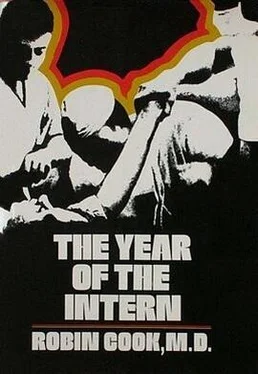One thing about the X-ray department — it never seemed to know where anything was. This X ray was less than an hour old, and still he couldn’t find it. He said he couldn’t understand it. They always said that, and I had to agree with them. The secretaries during the day were good at finding the blasted things, but they were the only ones. As the technician went through one stack of film after another, I leaned back against the counter and waited. It was like watching an endless replay of an incomplete pass. Finally he pulled one film from a bunch that were supposed to have already been read. Flicking it up into the X-ray view box, he turned on the light, which blinked a couple of times and then stayed on. The film was on backwards, so I turned it around.
It was a mess — the X ray, not the patient. Portable films were not, in fact, very good at all, and I was sure the radiologist would tell me that it had been ridiculous to order portables when the patient could have been sent upstairs to get a good film. I never tried to explain that a portable was justified because I could order it by phone from my room and then have it — provided it wasn’t lost — by the time I reached the patient. Otherwise I would end up sitting on my ass for an hour in the middle of the night waiting while the patient had a regular shot. This type of reasoning didn’t make much sense to someone — a radiologist, say — who slept all night long.
The X ray looked normal for a portable, which is to say that it was a blurred smudge except for the gas in the stomach and the fact that the diaphragm appeared elevated. Even that was misleading, because with the guy lying in bed you could never be sure from what angle the X-ray technician had taken the shot. Anyway, it looked all right.
Next I got the lab technician on the telephone and asked for the blood-count results. The blood lab was pretty good; usually they found test results right away. But tonight the technician there wanted my identification, because the hospital was not allowed to give out such information to unauthorized people. What a ridiculous question! Who else would be calling up about a stat blood count at three o’clock in the morning? I identified myself as Ringo Starr, which seemed to satisfy the girl. The blood count was normal, too.
Armed with all this information, I dialed the Supercharger. The sound of the phone ringing on the other end was a delight to my ears. Four, five, six times it rang. Supercharger, true to his reputation, was a deep sleeper. Finally he answered.
“This is Dr. Peters at the hospital. I’ve seen your patient, the hernia who was having trouble breathing.”
“Well, how is he?”
“Much better. Doctor. His stomach was badly dilated, and I evacuated almost a pint of fluid and a bunch of gas by putting down a nasogastric tube.”
“Yes, I thought that was the trouble.”
What a fake, I thought, convinced that Supercharger hadn’t had any notion about where the trouble might lie. I went on. “I thought it advisable to check out his other systems, too, so I have the results of a blood count, chest X ray, and EKG. They look acceptable. Everything but the diaphragm, which—”
A blast came through the telephone. “My God, boy, you don’t need all those crutches. My patient isn’t a millionaire, and this isn’t the Mayo Clinic. What the hell are you doing? I could have told you what was wrong by using nothing more than a stethoscope and a little percussion. You kids think the world was made for machines. Back when I was doing your job, we didn’t...” I could imagine his face getting red, the veins standing out on his neck. I sincerely hoped he would have insomnia for the rest of the night.
“And what have you done about the NG tube, Peters?”
“I put it on suction, Doctor, and left it in.”
“Don’t you know anything? He’ll just get pneumonia, with that thing down him. Get it out of there right now.”
“But, Doctor, the patient is still short of breath, and I’m afraid his stomach will dilate again right away.”
“Don’t argue with me. Get it out. None of my hernia patients are to have NG tubes. That’s one of my basic rules, Peters, basic.” Click. I was holding a dead telephone.
I went back to the ward and pulled the tube out. The patient was still struggling for breath, but not as badly as before. As I was leaving a nurse came in, obviously a little surprised and nervous to see me still there. She held a needle. Somewhat guiltily, she said that the Supercharger had called and ordered more sedative. I was so pissed off I didn’t even ask her what it was; I just left.
Now I had to decide where to go, my room or Karen’s apartment. The latter didn’t make sense, because Karen was surely sound asleep. Besides, none of my shaving stuff was there — a policy we followed to avoid explanations to the other fellow. If I went back to my own room, I could shave when I got up in the morning, a few hours from now. It was after three. So I returned to my quarters and called the night operator to tell her I was not at the other number any more. She said she understood. I wondered how much she understood.
I was hardly down on the pillow when the phone rang again. Sweet Jesus, I thought, probably an ER admission. What a bitch of a Tuesday night! But it was the same nurse saying that the hernia patient was much worse again, and the private doctor wanted me to see him again immediately. I was getting tired of this routine — up, down, up, down, seeing patients for whom my responsibility was so muddled and indistinct that I never knew where I stood. The ironies of the situation were considerable. Here the Supercharger had no sooner finished bawling me out for ordering some laboratory tests and for leaving in the NG tube than he had called the nurse — not me — to give some medication; and now he wanted me to see the patient again. It didn’t make any sense until you realized that you were just a convenient means of keeping the doctor up on his sleep. The patient obviously wasn’t getting what he was paying for. And I? Well, I was getting less than zero teaching. Someday, if I was lucky, I could look forward to being a doctor like him and not giving a shit about the intern, the patient, or medical care in general.
So, for me, it was down the elevator again, through the long hall, into the dark blue light that enveloped the sleeping hospital, my footsteps making distinct clicking noises, as if in a vacuum. It was peaceful now, but come seven-thirty I would be in poor shape for surgery. I felt like checking myself into the hospital for a good going-over. I had lost fifteen pounds since the first day of internship.
Suddenly, from behind me, the world was shattered by frantic sounds of glass and metal hitting against each other. Turning around, I saw the ER intern coming at a run toward me in the blue light of the hall, clutching his laryngoscope and an endotracheal tube. A nurse behind him pushed the tinkling crash cart.
“Cardiac arrest,” he panted, motioning for me to follow. We both ran now, and I wondered if it was the hernia patient.
“Which floor?” I asked.
“The private surgical ward, this floor.” He went headlong through the swinging doors. A light shone from the room where I had been before, and we rushed in, filling it up. The patient was on the floor near the sink. He had pulled the IV out of his arm and gotten out of bed. Two nurses were there, one trying to give closed-chest massage. I grabbed the board brought in by the nurse and threw it on the bed to make a firm surface for the massage.
“Put him up here,” I yelled, and the four of us lifted him onto the board. There was no pulse, no respiratory effort. His eyes were open, with widely dilated pupils, and his mouth was grotesquely agape. The ER intern slapped the chest very hard; no response. I pinched his nose, sealed my mouth over his, and blew in. There was no resistance, and the chest rose slightly. I breathed into him again and then motioned for the laryngoscope, while the ER intern began to give cardiac massage, getting up on the bed and kneeling beside the patient to do it. Every time he pushed on the chest, the patient’s head bounced violently.
Читать дальше












